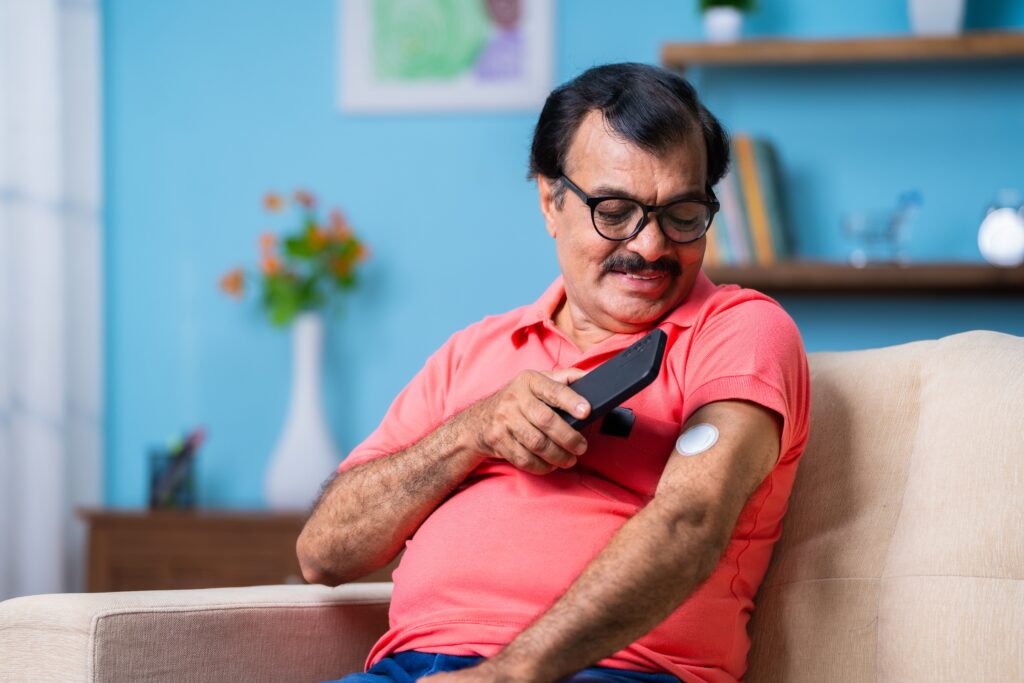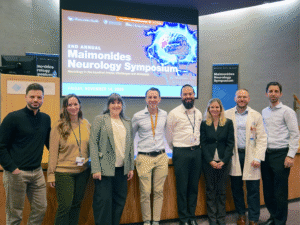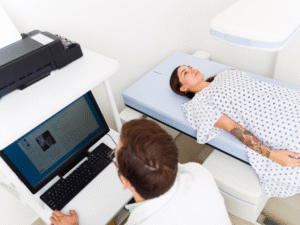November is American Diabetes Month, a time to raise awareness about this chronic health condition that affects nearly 1 million New Yorkers, and when managed improperly, can lead to serious health complications and even death. Continuous monitoring and management, however, can make all the difference in patients’ control of their disease. When it comes to diabetes care, patients’ self-administered care is just as critical to their health as specialized clinical oversight from their doctor.
At Maimonides Diabetes Education Center, dedicated Certified Diabetes Education and Care Specialists (CDCES) like Amy Huelle, MPH, RD, CDCES, and Jenna Del-Borrello, MS, RD, CDCES, are passionate about providing diabetes self-management education and support to patients. These specialists empower people with diabetes with the knowledge and skills to control their condition. This, along with ongoing support, improves quality of life and helps patients lower their risk of diabetes-related complications.
New Technology Means More Effective Diabetes Management
In recent years, new technologies have changed the way doctors and people with diabetes manage this challenging condition. Insulin pumps, continuous glucose monitors, and smart insulin pens simplify blood sugar surveillance and allow for easier, more discreet insulin administration. New technologies are continuing to emerge, providing an array of options for improved glucose management and, as a result, improved quality of life. Huelle and Del-Borrello offer individualized support, assisting patients in choosing the best option for their condition and lifestyle.
In the past, people with diabetes manually checked their blood sugar at timed intervals throughout the day. Now, continuous glucose monitors (CGMs) automatically measure glucose levels in the fluid between the cells every few minutes throughout the day.
In addition to being less painful than administering a finger-stick blood test multiple times daily, CGM information can be shared easily with clinicians, enabling them to fine-tune diabetes medications and diet and more precisely identify problems. CGMs also provide blood sugars in real time, teaching patients how they respond to different foods, meals, and physical activity. Smartphone apps make it easy for patients to view this information, and even administer insulin right from their phones.
“Studies have shown that patients using CGM have improved time in range and improved quality of life,” Huelle said. “They’re discreet — instead of pulling out a blood sugar meter, and checking blood sugar at the table, patients can discreetly look at their blood sugar on their smart phone. Instead of going to the restroom to give an insulin shot, they can simply press a button on the pump or their smartphone to administer insulin. It is exciting to see access to CGM and insulin pumps continuously expanding, and we hope all persons with diabetes will have access soon.”
For insulin administration, pumps have been around for many years, but pumps with automated insulin delivery are a more recent development, and Maimonides’ diabetes care teams are excited to offer the latest devices. They are worn on the body in addition to a CGM, and work together to adjust insulin by increasing, decreasing, or pausing insulin automatically every 5 minutes.
“Clinical trials have shown that with insulin pumps, time spent in normal blood sugar range improves, and the risk of life-threatening low blood sugars is reduced,” said Huelle.
Smart pens are another option for patients who are not ready or do not wish to wear a pump, but still want benefits like fine-tuned, more precise insulin dosing with CGM glucose readings. These are much less expensive than pumps and a great way to prepare for a pump if not quite ready.
Virtual Diabetes Care Facilitates Patient and Care Provider Collaboration
The COVID-19 pandemic spurred wide adoption of telehealth in the U.S., and it remains more common now than it was pre-pandemic. While telehealth can be convenient for any patient, accommodations like these have been especially critical for those with diabetes.
“During the pandemic, I saw an 81-year-old diabetes patient via telehealth from my kitchen. I taught her how to upload her insulin pump from the comfort of her own home,” Huelle explained. “I would have never imagined this scenario, but times have changed and after almost 30 years in my career, I have fully embraced and loved being part of it.”
A significant change more recently is that data from pumps and CGMs can now be automatically accessed from the cloud and shared virtually between patients and doctors. Maimonides diabetes care and education specialists are proud to offer patients this level of convenience and improvement in quality of life, and value the ease with which this allows patients to make their health a priority.
Prioritizing Diabetes Care at Maimonides
Along with the mainstays of diabetes care like diet management and leading an active lifestyle, clinicians like Huelle and Del-Borrello know that teaching patients how to use their diabetes management tools leads to greatly improved outcomes.
“In addition to being the place to go for the best diabetes care in Brooklyn, we are growing our center into the best place to go to incorporate the best, most cutting-edge technological options into each patient’s diabetes management plan. For those young or old, those new to diabetes or who have had it for many years, we want everyone to have access to these critical services.”
Whether someone is newly diagnosed or has had diabetes for years, it’s always important for them to work closely with their endocrinologists and care team to avoid major health issues. While self-management can seem overwhelming at times, Maimonides CDCESs are dedicated to simplifying and demystifying diabetes to help patients achieve the highest quality of life possible.
Learn more about Maimonides’ Division of Endocrinology and Diabetes Education Center here, or call (718) 283-8505 to schedule an appointment with an endocrine specialist or refer a patient.




